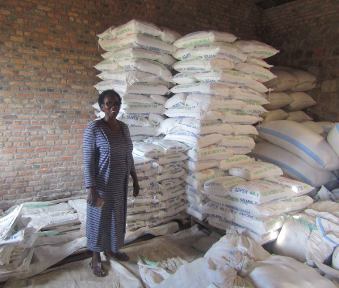Access to Finance Opens Opportunities for Women in Agribusinesses
Rwanda has registered commendable expansion in the financial sector in the recent past, enabling players in the sector to grow as well. Despite this positive trend, most women continue to miss out and are excluded or underserved. Their worst ordeal is the existence of non-financial barriers like operating in rural settings, low financial literacy, and bias towards women as not being bankable enough. But there is now hope for women venturing in.
Like most women, Phoebe Nyirafeza, a resident of Karongi District, Rwanda, has faced the lows and highs of succeeding usually reserved for men. Faced with the pressure of fending for her family after her husband retired in 2011, Phoebe started a small factory called DAZI that processed maize flour locally, known as Kawunga. Maize is abundantly produced in Karongi, and this seemed like an opportunity to add value to a commodity that was readily available and had a local market. She produces a mixture of porridge products, mixed cereals, and cracked corn to feed domestic animals.
However, all was not smooth since her business depended on the quality of yield and seasonal hazards, which made high-quality maize scarce. Being credit-shy worsened her situation, making it hard to raise enough capital to keep her business afloat. Suddenly, her prominence as a shrewd businesswoman around the Rubengera Sector, where she resides, started to fade as business decreased.
“This business has been challenging because I needed money to pay suppliers and to buy the best maize grades, yet prices have shot up,” Nyirafeza said. The hard fact of seeing her business worth roughly $30,500 (28 million Rwf) go down was a rude awakening. Then, opportunity came when the Feed the Future Hinga Weze activity assessed her business, offered training on record keeping, and linked her to INKUNGA Micro-Finance, providing credit worth over $115,000 (106 million Rwf) in September 2018. “From the first installment of $21,830 (20 million Rwf), I managed to restock raw materials and repair machines. Production has already improved.”
The Hinga Weze activity facilitates farmers to access finance, linking them to financial service providers. This is part of its wider goal of sustainably increasing smallholder farmers’ income, improving the nutritional status of women and children, and increasing the resilience of Rwanda’s agricultural and food systems. Hinga Weze intends to transform 560,000 smallholder farmers in ten districts.
By providing technical assistance to lenders to develop farmer-friendly loan products and build capacity for Savings and Credit Cooperatives (SACCOs), Hinga Weze has enabled agribusinesses to thrive. In Karongi alone, 155 women have been assisted to receive loans worth more than $138,000 (127 million Rwf). Like Nyirafeza, they are encouraging other women in agribusiness to improve on business record keeping, apply for credit, and make their businesses thrive.


